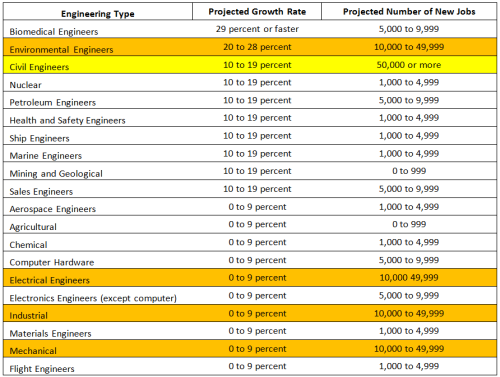Engineering degrees continue to provide excellent entry-level wages; they are the highest-valued degrees, averaging a salary of $62,535 according to the National Associate of Colleges and Employers’ April 2013 salary survey. Petroleum engineers are the highest paid, with an average salary of $93,500, a huge $20,000 leap over the second place computer engineers. Electrical, electronics, computer, mechanical, aerospace, biomedical, and chemical engineers all fall within the low to mid sixties bracket. Salary is only one piece of information to consider when deciding an engineering specialization; one must also consider the projected growth rate as well as the number of projected new jobs.

Data was extracted, and consolidated, from the Bureau of Labor Statistics’ 2010-2020 Occupational Outlook Handbook.
In light of this information, it becomes evident that not all engineering careers are created equal. Some careers, such as civil engineering, exhibit a 10 to 19 percent projected growth, with an estimated 50,000 or more new jobs.

Be aware that growth rates do not necessary translate into many job opportunities. Biomedical engineering jobs are said to grow by 29 percent, although that 29 percent represents only 5,000 to 9,999 new jobs, a vastly smaller pool of jobs when compared to mechanical engineering, which will be creating 10,000 to 49,999 new jobs, even if those jobs represent a much lesser growth rate of only 0 to 9 percent.
The statistics mirror the advice given by the engineering community from the DigiKey TechXchange forum. One member asked what engineering degree is the most flexible for finding employment in the present economy. Someone replied, “I'd stick with one of the basic engineering programs: Mechanical, Electrical, Civil etc, depending on your interest. There are definitely a wide variety of jobs available to Electrical Engineers right now, but you may have to move to where the jobs are.”Another user shares a similar opinion, “A pure EE [electrical engineering] degree is the best for future options and for immediate hire; with that said, an emphasis on real-time software and systems design is very desirable.”
All in all, 2013 is slated to be a positive year. In a recent article by John Rossheim published on Monster, Employers forecast a surge in new civil and environmental engineering positions resulting from increasing threat of global warming; again reinforcing the data produced by the Bureau of Labor Statistics. Recruiters predict 2013 as the year employers seek to rebuild the engineering profession and make up for the lost time due to the Great Recession.
Visit TechXchange to share your engineering related insights and opinions.
Advertisement
Learn more about Electronic Products Magazine





